高中英语语法总结大全之虚拟语气
(完整版)英语虚拟语气语法归纳总结
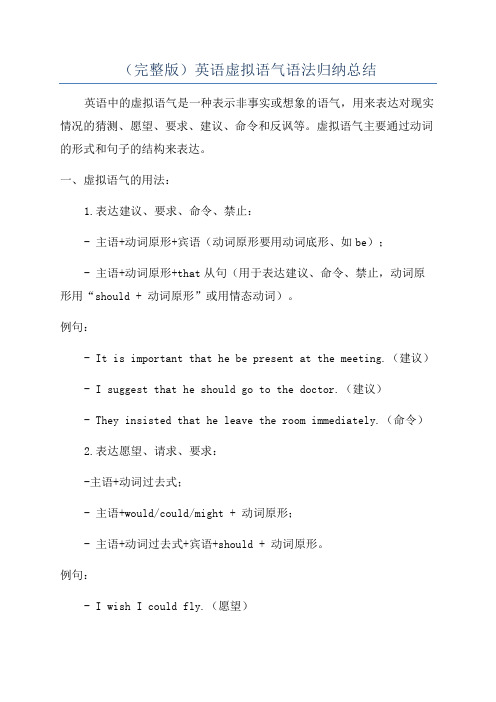
(完整版)英语虚拟语气语法归纳总结英语中的虚拟语气是一种表示非事实或想象的语气,用来表达对现实情况的猜测、愿望、要求、建议、命令和反讽等。
虚拟语气主要通过动词的形式和句子的结构来表达。
一、虚拟语气的用法:1.表达建议、要求、命令、禁止:- 主语+动词原形+宾语(动词原形要用动词底形、如be);- 主语+动词原形+that从句(用于表达建议、命令、禁止,动词原形用“should + 动词原形”或用情态动词)。
例句:- It is important that he be present at the meeting.(建议)- I suggest that he should go to the doctor.(建议)- They insisted that he leave the room immediately.(命令)2.表达愿望、请求、要求:-主语+动词过去式;- 主语+would/could/might + 动词原形;- 主语+动词过去式+宾语+should + 动词原形。
例句:- I wish I could fly.(愿望)- I would appreciate it if you could help me.(请求)3.表示虚拟条件:- If条件从句中的谓语动词用过去完成时,主句用would/should/might/could + have + 过去分词;- If条件从句中的谓语动词用过去时,主句用would/should/could + 动词原形。
例句:- If I had known his phone number, I would have called him.(虚拟条件)- If you had listened to me, we could have finished the project earlier.(虚拟条件)4.表达建议、要求、祝愿:- If only内部称述 + 主语 + 过去式。
高中英语语法——虚拟语气

虚拟语气含义:愿望(wish),假设(if),猜测,建议(suggest),不表示客观存在的事实种类:①条件状语从句(if类)②从句用should(should类)③时态倒退法④表祝愿①if类从句主句现在过去式did/were would/should/might/could+do 过去had done/been ...+have done/been...+do将来were to dodid/wereshould do❤省略if,引起部分倒装当从句中有were/had/should时,可省略if,将were...提前放句首❤含蓄条件句介词或介词短语:But for.../With/Without/Under(要不是)+名词短语+主句(虚拟)②should类(从句用should+do)表建议:suggest,advise,propose,recommend表要求:ask,demand,require,request,desire表主张:insist表命令:order❤suggest 建议(虚拟语气);暗示(不虚拟)insist 坚持主张(虚拟);坚持认为(不虚拟)❤It is/was+adj(strange/important/necessary/essential/natural)+that+从句(should+do)It is/was+n.(a shame/pity/surprise/no wonder)+that+should do(竟然)❤以防for fear that/in case that/lest+should do③时态倒退wish 过去:had doneas if/though +从句现在:did.wereif only要是...就好了将来:would/could/might do❤It is (high) time (that)...。
高中英语知识点归纳虚拟语气的用法和情况

高中英语知识点归纳虚拟语气的用法和情况虚拟语气是英语中的一种特殊语气,用于表达与事实相反、与现实相反或与说话人的愿望、建议、命令等相反的假设情况。
在高中英语学习中,掌握虚拟语气的正确用法对于理解和准确表达意思至关重要。
本文将归纳总结高中英语中虚拟语气的用法和情况。
一、虚拟语气的基本情况1. 过去虚拟语气(Subjunctive Mood)过去虚拟语气用于表示与现在事实相反的虚拟状态或行为。
例如:If I were you, I would study harder.如果我是你,我会更努力学习。
2. 现在虚拟语气(Subjunctive Mood)现在虚拟语气用于表示与过去事实相反的虚拟状态或行为。
例如:I wish I lived in a big city.我希望我住在一个大城市。
3. 将来虚拟语气(Subjunctive Mood)将来虚拟语气用于表示与现在或将来事实相反的虚拟状态或行为。
例如:If it should rain tomorrow, we would cancel the picnic.如果明天下雨,我们会取消野餐。
二、虚拟语气的具体用法1. 虚拟条件语句虚拟条件语句用于表示与现实相反的条件情况。
例如:If she were here, she would help you.如果她在这里,她会帮助你。
2. 虚拟愿望语句虚拟愿望语句用于表达对于现在或将来不可能实现的愿望。
例如:I wish I had more free time.我希望我有更多的空闲时间。
3. 虚拟建议语句虚拟建议语句用于表示对于过去的事情提出建议。
例如:I wish you had listened to me earlier.我希望你早点听我的话。
4. 虚拟命令语句虚拟命令语句用于表示对于过去的事情给出命令或要求。
例如:I demanded that he apologize immediately.我要求他立即道歉。
高中英语语法:虚拟语气

虚拟语气讲解第一部分:语气的定义和种类1 语气(mood)语气是动词的一种形式,表示说话人对某一行为或事情的看法和态度。
2 语气的种类⑴、陈述语气:表示动作或状态是现实的、确定的或符合事实的,用于陈述句、疑问句和某些感叹句。
如:①There are two sides to every question.每个问题都有两个方面。
②Were you busy all day yesterday?昨天一整天你都很忙吗?③How good a teacher she is!她是多好的一位老师啊!⑵、祈使语气:表示说话人对对方的请求或命令。
如:①Never be late again!再也不要迟到了。
②Don’t forget to turn off the light.别忘了关灯。
⑶、虚拟语气:表示动作或状态不是客观存在的事实,而是说话人的主观愿望、假设或推测等。
如:①If I were a bird, I could fly in the air.如果我是一只小鸟,我就能在空中飞行。
②I wish I could pass the examination.我希望我能通过考试。
③May you succeed!祝您成功!虚拟语气在语法里算得上是个难点。
让我们就从最简单的开始吧。
第二部分:简单句中的虚拟语气一、情态动词的过去式用于现在时态时,表示说话人的谦虚、客气、有礼貌、或委婉的语气,常用于日常会话中。
如:⑴.Would you be kind enough to show me the way to the post office?请你告诉我去邮局的路好吗?⑵.It would be better for you not to stay up too late.你最好别熬夜到很晚。
二、表祝愿。
1、常用“may+动词原形”表示祝愿,但愿,此时may须置于句首(多用于正式文体中)。
⑴、May good luck be yours!祝你好运!⑵、May you be happy!祝你快乐!⑶、May you do even better!祝你取得更大成就!⑷、May you have a good time. 祝愿你玩的痛快。
高中英语之虚拟语气详细讲解
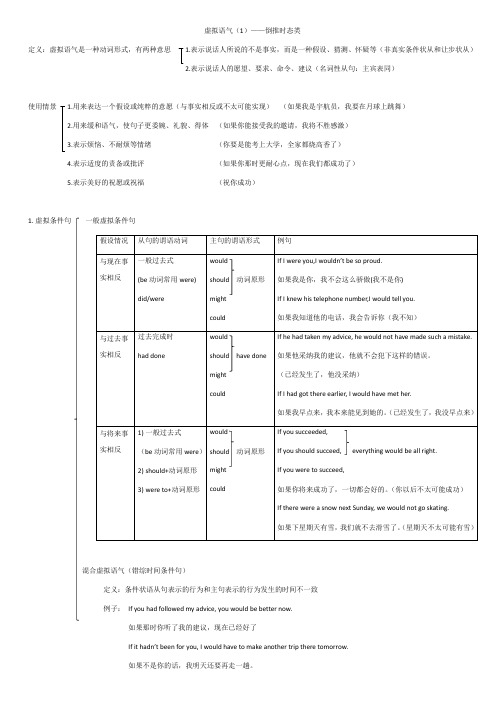
虚拟语气(1)——倒推时态类定义:虚拟语气是一种动词形式,有两种意思 1.表示说话人所说的不是事实,而是一种假设、猜测、怀疑等(非真实条件状从和让步状从)2.表示说话人的愿望、要求、命令、建议(名词性从句:主宾表同)使用情景 1.用来表达一个假设或纯粹的意愿(与事实相反或不太可能实现)(如果我是宇航员,我要在月球上跳舞)2.用来缓和语气,使句子更委婉、礼貌、得体(如果你能接受我的邀请,我将不胜感激)3.表示烦恼、不耐烦等情绪(你要是能考上大学,全家都烧高香了)4.表示适度的责备或批评(如果你那时更耐心点,现在我们都成功了)5.表示美好的祝愿或祝福(祝你成功)1.虚拟条件句一般虚拟条件句混合虚拟语气(错综时间条件句)定义:条件状语从句表示的行为和主句表示的行为发生的时间不一致例子:If you had followed my advice, you would be better now.如果那时你听了我的建议,现在已经好了If it hadn’t been for you, I would have to make another trip there tomorrow.如果不是你的话,我明天还要再走一趟。
If you had studied hard before,you would be a college student now.如果你以前努力学习的话,你现在就是大学生了。
省略+倒装当虚拟条件句的谓语动词中含有were,should,had时,if可以省略,并将were,should,had提前于句首,变为倒装句。
如果虚拟条件句是否定句,not 保留在原处If he should agree to go there, we should send him there.= Should he agree to go there,we should send him there.If she were there,she would agree with us.= Were she were, she would agree with us.If he had learnt about computers,we would have hired him.= Had he learnt about computers,we would have hired him.含蓄虚拟条件句定义:有时为了表达的需要,在虚拟语气中并不总是出现if引导的条件状语从句,而是通过其他手段来代替条件从句分类:1) but for....=(If it+be not for) ;without;Without your help ,we couldn’t have finished the work ahead of time.= But for your help,we couldn’t have finished the work ahead of time.= If it hadn’t been for your help,we couldn’t have finished the work ahead of time.没有你的帮助,我们不可能完成任务。
高中英语语法个人复习总结:虚拟语气

虚拟语气虚拟语气表示动作或状态不是客观存在的事实,而是说话人的主观愿望、假设、推测,有时甚至与事实相反。
一、虚拟语气在名词性从句中的用法1、在“It’s important/ strange/ natural/ necessary that…”这类句型里,that引导的主语从句中的谓语动词常用“(should) + V-原”结构。
eg: It’s necessary that he (should) be sent there at once.2、在动词wish 后的宾语从句中对过去的虚拟:had +过去分词wish that 对现在的虚拟:动词过去时(或动词过去进行时)对将来的虚拟:would/could + 动词原形eg: I wish that I had sent the old man to hospital in time.I wish that it were spring all the year round.She wishes that she were still living with her grandmother.I wish that you would/ could come soon.3、在表示建议、命令、要求的动词如:suggest/ advise/ propose/demand/ order/ command/ insist/ request/ desire/ require/ intend/recommend/ expect等后面的宾语从句中,谓语动词常用“(should) + V-原”结构。
eg: I suggest that we (should) set off at once.但其中两个词suggest与insist要注意使用:√要使用虚拟语气√暗示建议坚持要求坚持认为eg: Jean’s face suggested that she was ill, and her parents suggested that she (should) have a medical examine.The young man insisted that he had done nothing wrong, and heinsisted that he (should) be set free.4、在advice/ idea/ order/ demand/ plan/ proposal/ suggestion/ request等名词后面的表语从句和同位语从句中,谓语动词常用“(should) + V-原”结构。
虚拟语气用法总结(完整)
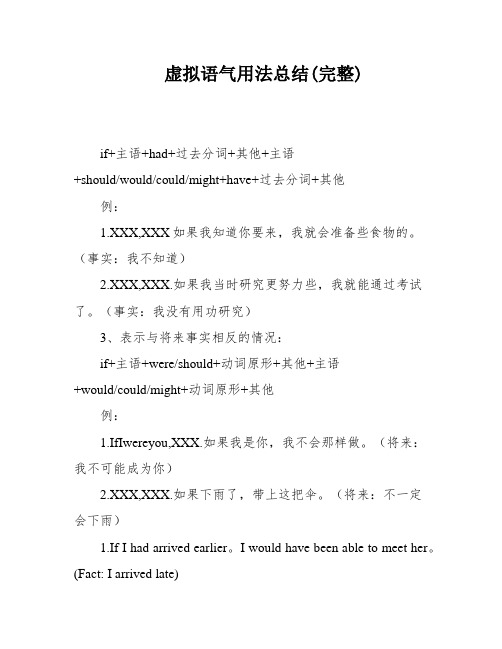
虚拟语气用法总结(完整)if+主语+had+过去分词+其他+主语+should/would/could/might+have+过去分词+其他例:1.XXX,XXX如果我知道你要来,我就会准备些食物的。
(事实:我不知道)2.XXX,XXX.如果我当时研究更努力些,我就能通过考试了。
(事实:我没有用功研究)3、表示与将来事实相反的情况:if+主语+were/should+动词原形+其他+主语+would/could/might+动词原形+其他例:1.IfIwereyou,XXX.如果我是你,我不会那样做。
(将来:我不可能成为你)2.XXX,XXX.如果下雨了,带上这把伞。
(将来:不一定会下雨)1.If I had arrived earlier。
I would have been able to meet her。
(Fact: I arrived late)2.If he had XXX my advice。
he would not have made such a mistake。
(Fact: He didn't listen to me)3.If he were to come here tomorrow。
I would talk to him。
(Fact: It's XXX he will come)In expressing ns。
orders。
requests。
etc。
the subjunctive mood is often used in the object clause。
with the verb in the form of "should + infinitive," which can be omitted.Other uses of XXX:1.The subjunctive mood is used in the object clause after "wish" to express a XXX fact。
高中英语语法总结大全-虚拟语气

高中英语语法总结大全-虚拟语气嘉兴英语教学网收集整理欢迎使用高中英语语法总结大全之虚拟语气虚拟语气1)概念虚拟语气用来表示说话人的主观愿望或假想,所说的是一个条件,不一定是事实,或与事实相反。
2)在条件句中的应用条件句可分为两类,一类为真实条件句,一类为非真实条件句。
非真实条件句表示的是假设的或实际可能性不大的情况,故采用虚拟语气。
真实条件句真实条件句用于陈述语气,假设的情况可能发生,其中if是如果的意思。
时态关系句型:条件从句主句一般现在时ha/wi动词原形Ifhecome,hewibringhivioin典型例题答案B。
真实条件句主句为将来时,从句用一般现在时。
注意:1)在真实条件句中,主句不能用begoingto表示将来,该用ha,wi错Ifoueavenow,ouarenevergoingtoregretit对Ifoueavenow,ouwineverregretit2)表示真理时,主句谓语动词便不用hawi动词原形,而直接用一般现在时的动词形式。
非真实条件句1)时态:可以表示过去,现在和将来的情况。
它的基本特点是时态退后。
a同现在事实相反的假设。
第1页共6页嘉兴英语教学网收集整理欢迎使用句型:条件从句主句一般过去时houdwoud动词原形Ifthewerehere,thewoudheeeterda,oIdidnottehimaboutit Ifhehadnotbeeniandmiedmancae,hewoudhavemadegreatereea rier,,thecroetoourmeetingtomorrow2)在宾语从句中的应用在表示命令、建议、要求等一类动词后面的从句中。
order,ugget,mand,inithouddoIuggetthatwehoudhoudbeentt here注意:如ugget,init不表示"建议"或"坚持要某人做某事时",即它们用于其本意"暗示、表明"、"坚持认为"时,宾语从句用陈述语气。
英语语法—虚拟语气(最全)
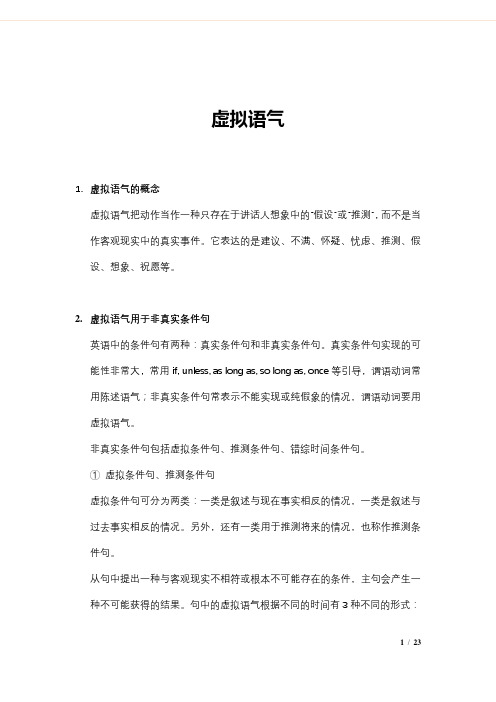
虚拟语气1.虚拟语气的概念虚拟语气把动作当作一种只存在于讲话人想象中的“假设”或“推测”,而不是当作客观现实中的真实事件。
它表达的是建议、不满、怀疑、忧虑、推测、假设、想象、祝愿等。
2.虚拟语气用于非真实条件句英语中的条件句有两种:真实条件句和非真实条件句。
真实条件句实现的可能性非常大,常用if, unless, as long as, so long as, once等引导,谓语动词常用陈述语气;非真实条件句常表示不能实现或纯假象的情况,谓语动词要用虚拟语气。
非真实条件句包括虚拟条件句、推测条件句、错综时间条件句。
①虚拟条件句、推测条件句虚拟条件句可分为两类:一类是叙述与现在事实相反的情况,一类是叙述与过去事实相反的情况。
另外,还有一类用于推测将来的情况,也称作推测条件句。
从句中提出一种与客观现实不相符或根本不可能存在的条件,主句会产生一种不可能获得的结果。
句中的虚拟语气根据不同的时间有3种不同的形式:I would lend him the money if he asked me.他要是问我,我愿意借钱给他。
(意愿)If he had time, he should do it.要是有时间,他愿意做那件事。
(意愿)He could move the big stone if he should try.努力的话,他能搬动那块大石头。
(能力)If he forgot to come, you could go instead.他要是忘了没来,你可要替他来。
(许诺)A.与现在事实相反If I had enough money, I would buy a computer.如果我有足够的钱,我将买一台电脑。
(实际上没有) Were I you I would refuse.如果我是你我会拒绝。
(我不是你)注:从句有时可用If it were not for这种句型,表示“若不是……”。
It it weren’t for your help, we would be in serious trouble.若不是你帮忙,我们会遇到大麻烦。
(完整版)英语虚拟语气语法归纳总结
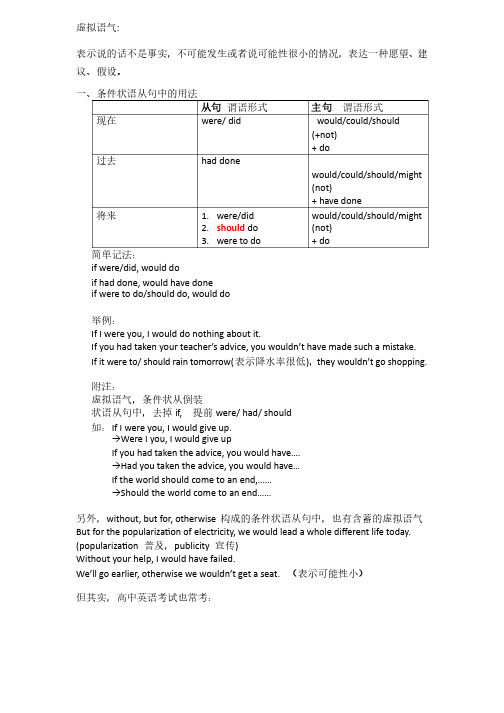
虚拟语气:表示说的话不是事实,表示说的话不是事实,不可能发生或者说可能性很小的情况,不可能发生或者说可能性很小的情况,不可能发生或者说可能性很小的情况,表达一种愿望、表达一种愿望、表达一种愿望、建建议、假设。
议、假设。
一、条件状语从句中的用法一、条件状语从句中的用法从句 谓语形式谓语形式主句 谓语形式谓语形式现在现在were/ didwould/could/should (+not) + do 过去过去 had donewould/could/should/might (not)+ have done将来将来1. were/did2. should do3. were to dowould/could/should/might (not) + do简单记法:简单记法:if were/did, would doif had done, would have done if were to do/should do, would do举例:举例:If I were you, I would do nothing about it.If you had taken your teacher’s advice, you wouldn’t have made such a mistake. If it were to/ should rain tomorrow(表示降水率很低),they wouldn’t go shopping.附注:附注:虚拟语气,条件状从倒装虚拟语气,条件状从倒装状语从句中,去掉if, 提前were/ had/ should 如:If I were you, I would give up. →Were I you, I would give upIf you had taken the advice, you would have…. →Had you taken the advice, you would have… If the world should come to an end,…… →Should the world come to an end……另外,without, but for, otherwise 构成的条件状语从句中,也有含蓄的虚拟语气构成的条件状语从句中,也有含蓄的虚拟语气 But for the populariza on of electricity, we would lead a whole different life today. (populariza on 普及,publicity 宣传) Without your help, I would have failed.We’ll go earlier, otherwise we wouldn’t get a seat. (表示可能性小)(表示可能性小)但其实,高中英语考试也常考:但其实,高中英语考试也常考:错综虚拟语气条件句错综虚拟语气条件句 即:即:假设条件状从发生的时间与所假设的谓语动词不一致,此时,主句和从句要根据各自的时间而定。
高中英语语法-虚拟语气全总结

虚拟语气用法总结大全一.虚拟语气在非真实条件句中二.虚拟语气在名词从句中1.在由suggest, demand, require, request, insist, order, command, propose等表示建议、请求、命令、愿望等动词或其同根词引出的名词从句中,名词从句虚拟句的谓语变化的形式只有一条规律——名词从句虚拟句无论其主句的谓语动词时何种形式,从句的谓语形式均为should+动词原形,其中should可以省三.虚拟语气的其他用法省一.虚拟语气在非真实条件句中1. — If the traffic hadn't been so heavy, I could have been back by 6 o'clock.—What a pity! Tina ______ here to see you. (2005 湖南)A. isB. wasC. would beD. has been2. It is hard for me to imagine what I would be doing today if I ______ in love, at the age of seven, with the Melinda Cox Library in my hometown. (2002 上海)A. wouldn't have fallenB. had not fallenC. should fallD. were to fall3. He hesitated(犹豫)for a moment before kicking the ball, otherwise he ______ a goal. (2001 上海春)A. had scoredB. scoredC. would scoreD. would have scored4. You didn't let me drive. If we _____in turn, you_____ so tired. (NMET96)A. drove; didn't getB. drove; wouldn't getC. were driving; wouldn't getD. had driven; wouldn't have got5. I didn't see your sister at the meeting. If she ______, she would have met my brother. (1994全国)A. has comeB. did comeC. cameD. had come6. -----If he__________, he __________that food.------Luckily he was sent to the hospital immediately. (MET93)A. was warned; would not takeB. had been warned; would not have takenC. would be warned; would not have takenD. would have been warned; had not taken7. If it_____ for the snow, we_____ the mountain yesterday. (MET91)A. were not; could have climbedB. were not; could climbC. had not been; could have climbedD. had not been; could climb8. Without electricity human life____ quite different today. (MET91)A. isB. will beC. would have beenD. would be11. --- Pity you missed the lecture on nuclear pollution.--- I it, but I was busy preparing for a job interview. (福建34’)A. attendedB. had attendedC. would attendD. would have attended12. I _______ through that bitter period without your generous help. ( 陕西22’)A. couldn’t have goneB. didn’t goC. wouldn’t goD. hadn’t gone13. I ______ sooner but I didn’t know that they we re waiting for me. (天津15’)A. had comeB. was comingC. would comeD. would have come14. I would have gone to visit him in the hospital had it been at all possible, but I fully occupied the whole of last week.A. wereB. had beenC. have beenD. was16. Had I known about this computer program, a huge amount time and energy .(2010浙江)A. would have been savedB. had been savedC. will be savedD. was saved17. ---- The weather has been very hot and dry.---- Yes. If it had rained even a drop, things would be much better now! And my vegetables .(2010北京)A. wouldn’t dieB. didn’t dieC. hadn’t diedD. wouldn’t have died18. If we the other road, we might have arrived here in time for the meeting. (2010湖南)A .followedB .should follow C. had followed D. would follow20. This printer is of good quality. If it _______ break down within the first year, we would repair it at our expense. (09天津15) A. would B. should C. could D. might 21. ------ Did you go to his wedding ceremony yesterday ? ------- No. But I would if I had been free. (改错) 二.虚拟语气在名词从句中1. — Where are the children? T he dinner’s going to be completely ruined.— I wish they always late. (北京28’)A. weren’tB. hadn’t beenC. wouldn’t beD. wouldn’t have been2. ______ in the regulations that you should not tell other people the password of your e-mail account. (05 上海)A. What is requiredB. What requiresC. It is requiredD. It requires3. —— Don't you think it necessary that he ______ to Miami but to New York?—— I agree, but the problem is ______ he has refused to. (2005 江苏)A. will not be sent; thatB. not be sent; thatC. should not be sent; whatD. should not send; what4.①The chairman suggested that the meeting _________________(put off) until the next week.②The look on his face suggested that he ____________(be) angry with what you did.5. Thank you for all your hard work last week. I don’t think we it without you. (08山东)A. can manageB. could have managedC. could manageD. can have managed6. The doctor recommended that you ____swim after eating a large meal.A. wouldn’tB. couldn’tC. needn’tD. shouldn’t (09浙江13)7.①The man in prison insisted that he _________nothing wrong and _________set free.A. had done, should beB. should do, should beC. had done, had beenD. should do, had b een②The patient insisted that he _________ill and _________to the hospital.A. wasn’t, wasn’t sentB. wasn’t, shouldn’t be sentC. shouldn’t be, wasn’t sentD. shouldn’t be, shouldn’t be se nt8.The workers demanded that their wages ___by 20 percent.A. raisedB. raiseC. should have been raisedD. be raised9. At the meeting everybody was against his suggestion that a new bridge ___over the river.A. be builtB. must be builtC. was to be builtD. had to be built10. It is politely requested by the hotel manager that radios ___after 11 o’clock at night.A. were not playedB. not be playedC. not to playD. did not play11. It is essential(必要的,重要的) that the books you borrowed from the library ___back before thedeadline(截止日期).A. be sentB. would be sentC. were sentD. must be sent三.虚拟语气的其他用法1. Look at the terrible situation I am in! If only I ___your advice.A. followB. had followedC. would followD. have followed2. Without the air to hold some of the sun's heat, the earth at night ______, too cold for us to live. (97 上海)A. would be freezing coldB. will be freezing coldlyC. would be frozen coldD. can freeze coldly3. It is necessary ___the dictionary immediately.A. that he will returnB. that he returnedC. that he returnD. that he has to return4. It’s already five o’clock now. Do you think it’s about time ___?A. we are going homeB. we go homeC. we went homeD. we can go home5. It ‘s high time you ___that you are not the most important person in the worldA. realizedB. have realizedC. realizeD. should be realizing6. You don’t have to be in such a hurry. I would rather you ___on business first.A. would goB. will goC. wentD. have gone7. George is going to talk about the geography of his country, but I’d rather he more on its culture.A .focus B. focused C. would focus D. had focused(2010江苏)8. I have watched that movie——it’ll give me horrible dreams.A. shouldn’tB. needn’tC. couldn’tD. mustn’t (2010山东)9. But for their help, we ___ the program in time. (09安徽34)A. can not finishB. will not finishC. had not finishedD. could not have finished10. But for the help of my English teacher, I ____ the first prize in the English Writing Competition.A. would not winB. would not have wonC. would winD. would have won (09福建35)11. What a pity? Considering his ability and experience, he better. (08江西)A. need have doneB. must have doneC. can have doneD. might have done12. If it were not for the fact that she _____ sing, I would invite her to the party. (2006 福建)A. couldn’tB. couldC. can’tD. might not13. ______ fired, your health care and other benefits would be immediately cut off.(2006 湖北)A. Would you beB. Should you beC. Could you beD. Might you be14. When a pencil is partly in a glass of water, it looks as if it ______. (1995 全国)A. breaksB. has brokenC. were brokenD. had been broken15. ______for the free tickets, I would not have gone to the films often. (1995 上海)A. If it is notB. Were it notC. Had it not beenD. If they were not16. What would have happened _________ , as far as the river bank? (NMET 2001 上海)A. Bob had walked fartherB. if Bob should walk fartherC. had Bob walked farther C. if Bob walked farther。
高中英语语法虚拟语气

三. 虚拟语气的常见句型
1.would rather 与 had rather 表希望, 后跟的从句用虚拟, 动词一般用过去式。
eg: I would rather you didn’t trouble him.
Jane went home on Saturday, but her father
would rather she _C____ home on Sunday.
2. insist: 表示坚持一个事实时, 从句动词 不用虚拟
He insisted that we should discuss the question at once.
he had done his homework and handed it in.
2.主语从句中
主句中的谓语动词
从句中的谓语动词
1.表语从句中和同位语从句中
主句中的主语
从句中的谓语动词
suggestion; demand; order; (should)do
proposal; plan; advice; decision等
eg : My suggestion is ( that) we (should) do the
experiment again.
3.我希望明天你能跟我一起去。
I wish you could go with me tomorrow.
四.虚拟语气在主从复合句中的用法
1.宾语从句中
主句中的谓语动词
从句中的谓语动词
suggest; demand; order; (should)do
insist; request; desire; propose; decide等
2). I’m getting tired. It’s time we _w__e_n_t__
高中英语虚拟语气重点归纳

虚拟语气表示动作或状态与事实相反,或不可能发生的情况。
一.虚拟语气用于条件状语从句中1. 表示与现在事实相反或不可能发生:条件状语从句:一般过去时(虚拟语气中be→were)主句用:would(should, could, might)+动词原形。
Eg:If we had time now, we would read it again.If I were you, I would work hard.2. 表示与过去事实相反或不可能发生:条件状语从句:had+过去分词;主句:would(should, could, might)+have+过去分词。
Eg:If he had taken my advice, he would have succeeded in the test.If I had known your telephone number then, I would have called you.3. 表示与将来的事实可能相反或不可能发生:条件状语从句:①一般过去时②should +动词原形③were to+动词原形;主句:would(should, could, might)+动词原形。
Eg:If it should rain, the crops would be saved.If it were to snow tomorrow, they would not go out.注:虚拟条件句的特殊情况(1)混合/错综型虚拟语气当条件状语从句表示的行为和主句表示的行为所发生的时间不一致时,称为‘错综条件句’,动词的形式要根据它所表示的时间作出相应的调整。
Eg:If you had followed my advice, you would be better now.(从句说的是过去,主句是现在)Eg:If I were you, I would have taken his advice.(从句是现在,主句是过去)(2)省略if的虚拟语气如果从句中含有were/ should/ had时,则可以把这三个词置于句首,省略if.采用倒装语序。
高中语法精讲虚拟语气

高中语法精讲虚拟语气(1)对现在的虚拟If从句主句did/were would/should/could/might doIf I were you, I would tell her the truth.=Were I you, I would tell her the truth.If条件句的倒装:去掉if, 句子部分倒装(半倒装,即以前学过的一般疑问句的语序)备注虚拟语气中,不管主语是不是单数都用were(2)对过去的虚拟If从句主句had done would/should/could/might have doneIf you had taken my advice, you would have passed the exam.=Had you taken my advice, you would have passed the exam.省略if(3)对将来的虚拟If从句主句did/should do/were to do would/should /could/might doIf he didn't come tomorrow, we would put off the meeting.=If he should come tomorrw, we would put off the meeting.=If he were to come tomorrw, we would put off the meeting.总结主过将从过主过将完从过完[例1](陕西卷)If we ___the other road, we might have arrived here in time for the meeting.A. takeB. had takenC. tookD. have taken答案B主句是过将完,所以从过完,过去完成时[例2](天津卷)--John went to the hospital alone.--If he___me about it, I would have gone with him.A. should tellB. tellsC. toldD. had told答案D[例3] (2013重庆)- It rained cats and dogs this morning. I'm glad we took an umbrella.- Yeah, we would have got wet all over if we__A. hadn'tB. haven'tC. didn'tD. don't答案A省略特殊情况①错综时间条件句例: If you had followed my advice just now, you would be better now.If you had studied hard before, you would be a college student now.做题时注意:动词的形式根据它所表示的时间作出相应的调整。
高中英语语法-虚拟语气全总结
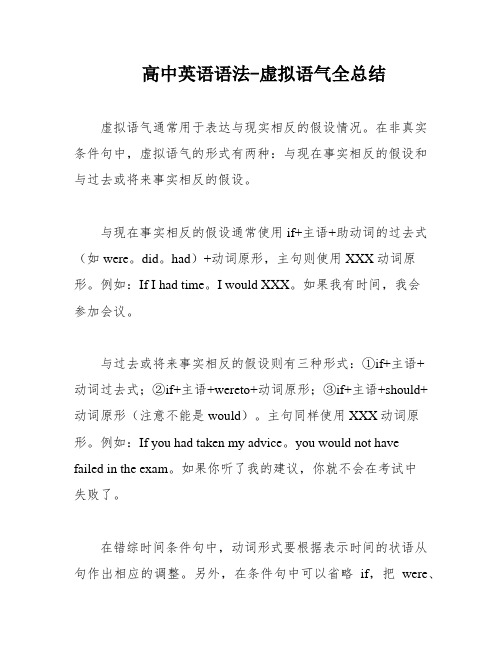
高中英语语法-虚拟语气全总结虚拟语气通常用于表达与现实相反的假设情况。
在非真实条件句中,虚拟语气的形式有两种:与现在事实相反的假设和与过去或将来事实相反的假设。
与现在事实相反的假设通常使用if+主语+助动词的过去式(如were。
did。
had)+动词原形,主句则使用XXX动词原形。
例如:If I had time。
I would XXX。
如果我有时间,我会参加会议。
与过去或将来事实相反的假设则有三种形式:①if+主语+动词过去式;②if+主语+wereto+动词原形;③if+主语+should+动词原形(注意不能是would)。
主句同样使用XXX动词原形。
例如:If you had taken my advice。
you would not have failed in the exam。
如果你听了我的建议,你就不会在考试中失败了。
在错综时间条件句中,动词形式要根据表示时间的状语从句作出相应的调整。
另外,在条件句中可以省略if,把were、had、should提到句首,变成倒装句式。
例如:Were I at school again。
I would study harder。
如果我还有上学的机会,我会更加努力研究。
Had you arrived earlier。
you would have caught the bus.If it rains tomorrow。
XXX climbing.What would you do with a n dollars?We couldn't have finished the work ahead of time without your help.Otherwise。
I would have taken part in the sports meeting.XXX me of your birthday。
or else I would have known nothing about it.A man who s drinking water would be dead in about seven days.I might have been XXX assistance。
高中语法专题解析虚拟语气

高中语法专题解析虚拟语气虚拟语气(Subjunctive Mood)是英语中一种特殊的语气,用于表示假设、愿望、建议、要求、命令等虚拟的情况或假设。
在高中语法学习中,掌握虚拟语气的用法是十分重要的。
本文将针对高中语法专题解析虚拟语气进行详细讲解。
一、条件虚拟语气条件虚拟语气用于表示与现实相反的假设情况,包括对现在和将来的假设。
其主要形式为:if + 条件从句 (Past Simple), 主句(would/could/might + 动词原形),例如:1. If I were a bird, I would fly in the sky freely.(如果我是一只鸟,我就可以在天空中自由飞翔。
)2. If it rained tomorrow, we would stay at home.(如果明天下雨,我们会呆在家里。
)需要注意的是,条件从句中的动词通常使用过去式形式,而主句中的动词则使用情态动词 would/could/might + 动词原形的形式。
二、虚拟语气用于表达愿望、建议、要求1. 表达愿望虚拟语气可以用于表达对现在或将来情况的愿望,常见的句型有:- I wish/If only + 主语 + 过去式:用于表达对现在情况的不满或遗憾的愿望,例如:"I wish I were taller."(我希望我个子高一些。
)- I wish/If only + 主语 + would/could/过去式:用于表达对现在情况的希望或期望,例如:"I wish you would come to my party."(我希望你能来参加我的派对。
)2. 表达建议虚拟语气可以用于表达对过去情况的建议,常见的句型有:- It's time/It's high time + 主语 + 过去式:用于表示现在情况应该采取的行动,例如:"It's time you finished your homework."(你该完成作业了。
高中英语语法备考大全 专题16 虚拟语气

专题16 虚拟语气◎简单句中的虚拟语气◎虚拟语气在条件从句和主句中◎名词性从句中的虚拟语气一、语气的定义和种类1.语气语气是动词的一种形式,表示说话人对某一行为或事情的看法和态度。
2.语气的种类(1)陈述语气:表示动作或状态是现实的、确定的或符合事实的,用于陈述句、疑问句和某些感叹句。
如:There are two sides to every question.每个问题都有两个方面。
Were you busy all day yesterday?昨天一整天你都很忙吗?How good a teacher she is! 她是多好的一位老师啊!(2)祈使语气:表示说话人对对方的请求或命令。
如:Never be late again! 再也不要迟到了。
Don’t forget to turn off the light.别忘了关灯。
(3)虚拟语气:表示动作或状态不是客观存在的事实,而是说话人的主观愿望、假设或推测等。
如:If I were a bird, I could fly in the air.如果我是一只小鸟,我就能在空中飞行。
I wish I could pass the examination.我希望我能通过考试。
May you succeed! 祝您成功!二、简单句中的虚拟语气1.情态动词的过去式用于现在时态时,表示说话人的谦虚、客气、有礼貌、或委婉的语气,常用于日常会话中。
如:Would you be kind enough to show me the way to the post office?请你告诉我去邮局的路好吗?It would be better for you not to stay up too late.你最好别熬夜到很晚。
2.表祝愿(1)常用“may+动词原形”表示“祝愿,但愿”,此时may须置于句首(多用于正式文体中)如:May good luck be yours! 祝你好运!May you do even better! 祝你取得更大成就!May you have a good time. 祝愿你玩得痛快。
高中英语语法总结大全之虚拟语气

高中英语语法总结大全之虚拟语气虚拟语气1)概念虚拟语气用来表示说话人的主观愿望或假想,所说的是一个条件,不一定是事实,或与事实相反。
2)在条件句中的应用条件句可分为两类,一类为真实条件句,一类为非真实条件句。
非真实条件句表示的是假设的或实际可能性不大的情况,故采用虚拟语气。
真实条件句真实条件句用于陈述语气,假设的情况可能发生,其中if 是如果的意思。
时态关系句型:条件从句主句一般现在时shall/will + 动词原形If he comes, he will bring his violin.典型例题The volleyball match will be put off if it ___.A.will rainB. rainsC. rainedD. is rained答案B。
真实条件句主句为将来时,从句用一般现在时。
注意:1)在真实条件句中,主句不能用be going to表示将来,该用shall, will.(错) If you leave now, you are never going to regret it.(对) If you leave now, you will never regret it.2)表示真理时,主句谓语动词便不用shall (will) +动词原形,而直接用一般现在时的动词形式。
非真实条件句1)时态:可以表示过去,现在和将来的情况。
它的基本特点是时态退后。
a.同现在事实相反的假设。
句型:条件从句主句一般过去时should( would) +动词原形If they were here, they would help you.b.表示于过去事实相反的假设。
句型:条件从句主句过去完成时should(would) have+ 过去分词If she had worked harder, she would have succeeded.The rice would not have been burnt if you had been more careful.If my lawyer had been here last Saturday, he would have prevented me from going.If he had come yesterday, I should / would have told him about it.含义:He did not come yesterday, so I did not tell him about it.If he had not been ill and missed many classes, he would have made greater progress.含义:He was ill and missed many lessons, so he did not make greater progress.c.表示对将来的假想句型:条件从句主句一般过去时should+ 动词原形were+ 不定式would + 动词原形should+ 动词原形If you succeeded, everything would be all right.If you should succeed, everything would be all right.If you were to succeed, everything would be all right.混合条件句主句与从句的动作发生在不同的时间,这时主,从句谓语动词的虚拟语气形式因时间不同而不同,这叫做混合条件句。
高中语气虚拟知识点总结

高中语气虚拟知识点总结一、虚拟语气的基本概念1. 虚拟语气是用来表达说话者所希望或假设的情况,而不是真实的情况。
它通常出现在条件句、宾语从句和主语从句中。
2. 虚拟语气的形式包括过去时、过去完成时和 should/would/could/might+动词原形等形式。
3. 在条件句中,如果条件句是虚拟的,那么其结果句也要使用虚拟语气,即用过去时(be 动词用were)、过去完成时或 should/would/could/might+动词原形等形式。
二、虚拟语气在宾语从句中的用法1. 在宾语从句中,如果主句是虚拟的,那么宾语从句也要使用虚拟语气。
比如:主句:I wish that he were here.宾语从句: He wishes (that) he could go with you.2. 特殊的动词词组,如:suggest, propose, demand, insist, mandate等动词后的宾语从句要使用虚拟语气。
比如:They demanded that he apologize for his mistake.3. 如果宾语从句表示的是将来的情况,那么要使用should/would/could/might+动词原形等形式,表示愿望或假设。
比如:I suggested that he should visit his aunt next week.三、虚拟语气在主语从句中的用法1. 在主语从句中,如果主语从句是虚拟的,那么谓语动词也要使用虚拟语气。
比如:It is essential that he be here on time.2. 特殊的情况下,虚拟语气还可以出现在“it is +形容词+that从句”结构中,表示建议或要求。
比如:It is necessary that he complete the task by tomorrow.四、虚拟语气在条件句中的用法1. 虚拟条件句表示与现实相反的情况,通常使用过去式(be动词用were)或should/would/could/might+动词原形等形式。
- 1、下载文档前请自行甄别文档内容的完整性,平台不提供额外的编辑、内容补充、找答案等附加服务。
- 2、"仅部分预览"的文档,不可在线预览部分如存在完整性等问题,可反馈申请退款(可完整预览的文档不适用该条件!)。
- 3、如文档侵犯您的权益,请联系客服反馈,我们会尽快为您处理(人工客服工作时间:9:00-18:30)。
高中英语语法总结大全之虚拟语气虚拟语气1)概念虚拟语气用来表示说话人的主观愿望或假想,所说的是一个条件,不一定是事实,或与事实相反。
2)在条件句中的应用条件句可分为两类,一类为真实条件句,一类为非真实条件句。
非真实条件句表示的是假设的或实际可能性不大的情况,故采用虚拟语气。
真实条件句真实条件句用于陈述语气,假设的情况可能发生,其中if 是如果的意思。
时态关系句型:条件从句主句一般现在时shall/will + 动词原形If he comes, he will bring his violin.典型例题The volleyball match will be put off if it ___.A.will rainB. rainsC. rainedD. is rained答案B。
真实条件句主句为将来时,从句用一般现在时。
注意:1)在真实条件句中,主句不能用be going to表示将来,该用shall, will.(错) If you leave now, you are never going to regret it.(对) If you leave now, you will never regret it.2)表示真理时,主句谓语动词便不用shall (will) +动词原形,而直接用一般现在时的动词形式。
非真实条件句1)时态:可以表示过去,现在和将来的情况。
它的基本特点是时态退后。
a.同现在事实相反的假设。
句型:条件从句主句一般过去时should( would) +动词原形If they were here, they would help you.b.表示于过去事实相反的假设。
句型:条件从句主句过去完成时should(would) have+ 过去分词If she had worked harder, she would have succeeded.The rice would not have been burnt if you had been more careful.If my lawyer had been here last Saturday, he would have prevented me from going.If he had come yesterday, I should / would have told him about it.含义:He did not come yesterday, so I did not tell him about it.If he had not been ill and missed many classes, he would have made greater progress.含义:He was ill and missed many lessons, so he did not make greater progress.c.表示对将来的假想句型:条件从句主句一般过去时should+ 动词原形were+ 不定式would + 动词原形should+ 动词原形If you succeeded, everything would be all right.If you should succeed, everything would be all right.If you were to succeed, everything would be all right.混合条件句主句与从句的动作发生在不同的时间,这时主,从句谓语动词的虚拟语气形式因时间不同而不同,这叫做混合条件句。
If you had asked him yesterday, you would know what to do now.(从句与过去事实相反,主句与现在事实相反。
)If it had rained last night (过去), it would be very cold today (现在).虚拟条件句的倒装虚拟条件句的从句部分如果含有were, should, 或had, 可将if省略,再把were, should 或had 移到从句句首,实行倒装。
Were they here now, they could help us.=If they were here now, they could help us.Had you come earlier, you would have met him=If you had come earlier, you would have met him.Should it rain, the crops would be saved.=Were it to rain, the crops would be saved.注意:在虚拟语气的从句中,动词'be'的过去时态一律用"were",不用was,即在从句中be用were代替。
If I were you, I would go to look for him.如果我是你,就会去找他。
If he were here, everything would be all right.如果他在这儿,一切都会好的。
典型例题_____ to do the work, I should do it some other day.A. If were IB. I wereC. Were ID. Was I答案C. 在虚拟条件状语中如果有were, should, had这三个词,通常将if省略,主语提前, 变成were, should, had +主语的形式。
但要注意,在虚拟条件状语从句中,省略连词的倒装形式的句首不能用动词的缩略形式。
如我们可说Were I not to do., 而不能说Weren't I to do.特殊的虚拟语气词:should1)It is demanded / necessar y / a pity + that…结构中的主语从句的谓语动词要用should 加动词原形,should 可省略。
句型:(1)suggestedIt is(2)importantthat…+ (should) do(3) a pity(1)suggested, ordered, proposed, required,demanded, requested, insisted;+ (should) do(2)important, necessary, natural, strangea pity,a shame,no wonder(3)It is suggested that we (should) hold a meeting next week.It is necessary that he (should) come to our meeting tomorrow.2)在宾语从句中的应用在表示命令、建议、要求等一类动词后面的从句中。
order, suggest, propose, require, demand, request, insist, command, insist + (should) doI suggest that we (should) hold a meeting next week.He insisted that he (should ) be sent there.注意:如suggest, insist不表示"建议" 或"坚持要某人做某事时",即它们用于其本意"暗示、表明"、"坚持认为"时,宾语从句用陈述语气。
The guard at gate insisted that everybody obey the rules.判断改错:(错)You pale face suggests that you (should) be ill.(对)Your pale face suggests that you are ill.(错)I insisted that you ( should) be wrong.(对)I insisted that you were wrong.3)在表语从句,同位语从句中的应用在suggestion, proposal, idea, plan, order, advice等名词后面的表语从句、同位语从句中要用虚拟语气,即(should)+动词原形。
My idea is that we (should) get more people to attend the conference.I make a proposal that we (should) hold a meeting next week.wish的用法1)用于wish后面的从句,表示与事实相反的情况,或表示将来不太可能实现的愿望。
其宾语从句的动词形式为:真实状况wish后现在时过去时从句动作先于主句动词动作(be的过去式为were)过去时过去完成时从句动作与主句动作同时发生(had + 过去分词)将来不大可能实现的愿望将来时would/could +动词原形I wish I were as tall as you.我希望和你一样高。
He wished he hadn't said that. 他希望他没讲那样的话。
I wish it would rain tomorrow. 我希望明天下雨就好了。
2)Wish to do表达法。
Wish sb / sth to doI wish to see the manager. = I want to see the manager.I wish the manager to be informed at once. (= I want the manager to be informed at once.)比较if only与only ifonly if表示"只有";if only则表示"如果……就好了"。
If only也可用于陈述语气。
I wake up only if the alarm clock rings. 只有闹钟响了,我才会醒。
If only the alarm clock had rung.当时闹钟响了,就好了。
If only he comes early.但愿他早点回来。
It is (high) time thatIt is (high) time that 后面的从句谓语动词要用过去式或用should加动词原形,但should 不可省略。
